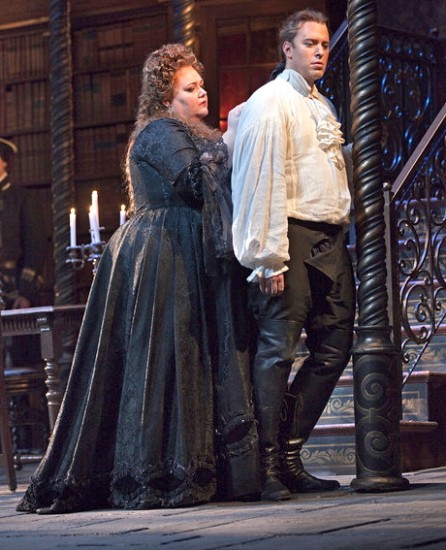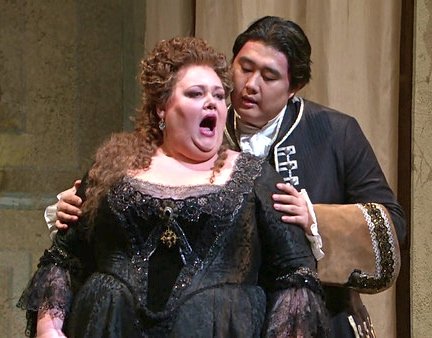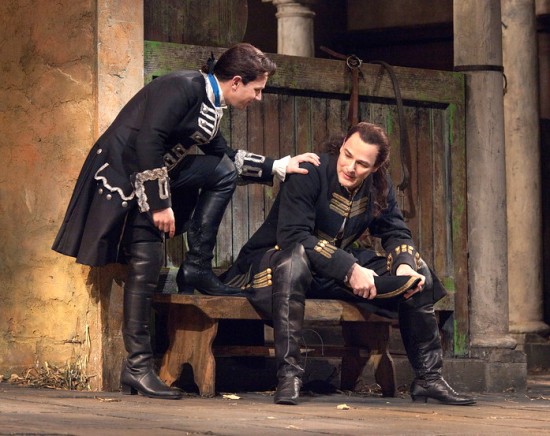Ren…e Fleming¬†is everything.¬† She is a great actress with a beautiful soprano voice; she is a wonderful hostess for many of the¬†MetHD¬†programs.¬† I have heard and seen her on the big HD screen many times, and last year had the thrill of seeing her live in¬†San Francisco Opera’s production of¬†Rossini’s¬†Rinaldo.¬† I always enjoy hearing her, and I always enjoy seeing her, but in many of her roles part of me notes that I am seeing a great actress.
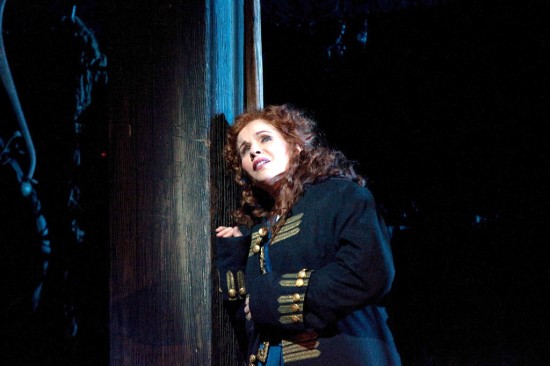
Saturday December 3 was different.¬†¬†Fleming¬†was not an actress playing Rodelinda.¬† She WAS Rodelinda. Her expressive face was showing every emotion that Rodelinda was feeling.¬† Thanks to the close-up camera, at one point I could see a tear in her eye.¬† I don’t know about you, but when emotion brings a tear to my eye, it usually also brings a lump to my throat.¬† But not this woman.¬† The rest of her may have been an Italian queen, but the voice was still¬†Ren…e Fleming doing full justice to¬†Handel’s glorious music.
Last year she starred in the¬†MetHD’s¬†Capriccio¬†(see my review), and that’s quite a contrast.¬† Not only is¬†Strauss’ music vastly different from¬†Handel’s, but his opera has a gossamer-thin plot and all the other roles are minor and serve primarily to illuminate¬†Fleming’s character.¬†¬†Rodelinda, on the other hand has a robust plot filled with love requited, love unrequited, loyalties, and double-dealings with every character relevant to the whole.
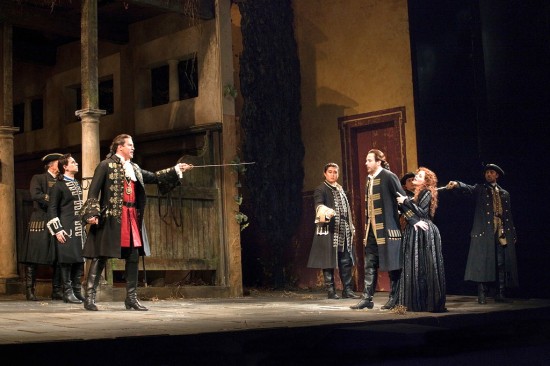
Meet the cast, starting with the King of Lombardy and his family:
- King Bertarido (Counter-tenor Andreas Scholl), recently deposed and believed dead
- Rodelinda (Soprano¬†Ren…e Fleming), his queen-consort, deeply in love with her husband
- Flavio (Moritz Linn (non-vocal role), their 10-year old son
- Eduige (Mezzo¬†Stephanie Blythe), Bertarido’s sister
- Grimoaldo¬† (Tenor¬†Joseph Kaiser), Duke of Benevento and usurper to Lombardy’s throne
- Garibaldo (Bass-baritone Shenyang), Duke of Turin and counselor to Grimoaldo
- Unulfo (Counter-tenor Iestyn Davies), loyal friend of Bertarido
As in most operas, “love” plays an important role.¬† Also as¬†usual, it’s not always simple. Here’s the scorecard to help you keep track of the combatants:
- Bertarido and Rodelinda – mutual love for each other and no yearnings for anyone else.
- Grimoaldo and Eduige Рthis one keeps changing with first one in love but spurned by the other and then vice-versa.  Pay close attention to which phase they are in when.
- Grimoaldo and Rodelinda – she has naught but scorn for him, but his emotions develop slowly; first he figures that with Bertarido dead, marrying his widow is the easiest way to the throne, but her principled denials of his suit inflame his passion and he begins to desire her as a woman.
- Garibaldo loves only himself and will love himself even more if he is king – more on this later.
- Unulfo is intensely loyal to Bertarido – no place in his life for a mere woman .
- Flavio?¬† Hey, give me a break.¬† He’s a ten-year old boy!
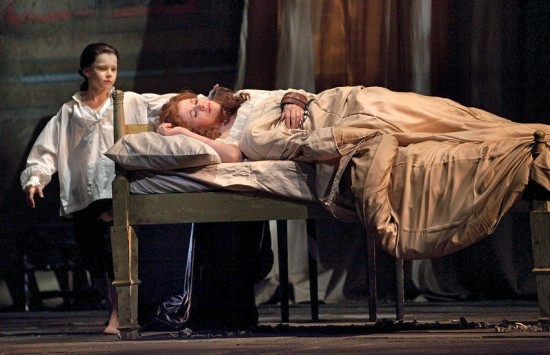
Act I begins with Flavio and Rodelinda waking up and getting out of their beds.¬† We see that she has one arm handcuffed to a long chain, the other end of which is attached to the bed.¬† Grimoaldo enters, unlocks her wrist, and says, “You are free.¬† Marry me.”¬† “No way,” says the lady.
Scene 2: Eduige says to Grimoaldo, “I love you.¬† You used to love me.¬† Why are you so cold?” He replies, “You spurned me once.¬† Now I going to marry Rodelinda and become King,” and exits.¬† She rages, “My love has turned to hate.¬† I’ll have my revenge.”
Garibaldo overhears this last remark and offers his services.¬† “I’ll kill him for you and also the brat.¬† The throne will be yours.¬† I’ll marry you and be King.¬† So what if we’re not in love.¬† You’ll be Queen and I’ll be King – that’s all that matters.”
Scene 3: Bertarido shows up in disguise to confer with Unulfo.¬† He’s willing to give up the Kingdom.¬† All¬†he wants is to escape with his wife and son.¬† Unulfo says the time isn’t ripe yet – he must stay hidden.¬† Voices are heard – Bertarido hides where he can see and hear¬†everything.¬† Rodelinda and Flavio appear followed later by Grimoaldo and Garibaldo.¬† Grimoaldo seizes Flavio and holds a knife to his throat, saying to Rodelinda, “Either you marry me or I kill your son.”¬† “I surrender; I will marry you,” she says, and they all leave.
Bertarido now has the stage to himself and he proceeds to demonstrate that not only can a counter-tenor sing higher notes than a regular operatic tenor, he can also be even more stupid.¬† Instead of trying to think of something constructive to do, he rants and raves against his wife: “A fine faithful wife she is, NOT.¬† First little threat and she forgets all about me and runs eagerly to the usurper.”¬† This being a¬†Handel¬†opera, he sings this at least four times, growing more vehement with each repetition.¬† Good Lord, man.¬† You saw the villain holding cold steel across her son’s throat.¬† What on earth do you expect a mother to do?¬† Bah!¬† Curtain.
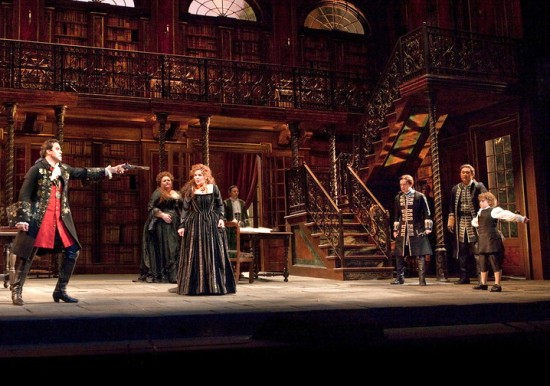
In Act II, Rodelinda shows us that she is not your usual run-of-the-mill operatic soprano – she is made of stronger stuff.¬† She confronts Grimoaldo with, “I’ll marry you, but on one condition: you must personally kill my son, here and now in front of me.”¬† Was it a bluff, or did she mean it?¬† As staged by producer¬†Stephen Wadsworth, Grimoaldo sang a lengthy aria waving a gun at the boy while debating with himself about pulling the trigger – had he done so, Rodelinda would have had no chance to change her mind.¬† But he didn’t fire so we’ll never know if Rodelinda honestly believed that Flavio was better off dead than with Grimoaldo as a step father, or if she knew the man that well and was confident that he’d back down.
Things happen.¬† Eduige discovers that the unidentified soldier is her brother in disguise.¬† When he starts to rant about his faithless wife, Eduige sets him straight: “You idiot.¬† Didn’t you see that knife at your son’s throat?¬† What do you think a mother will say under that threat?¬† She loves you and no other and if you don’t believe it you’re even stupider than I thought.”
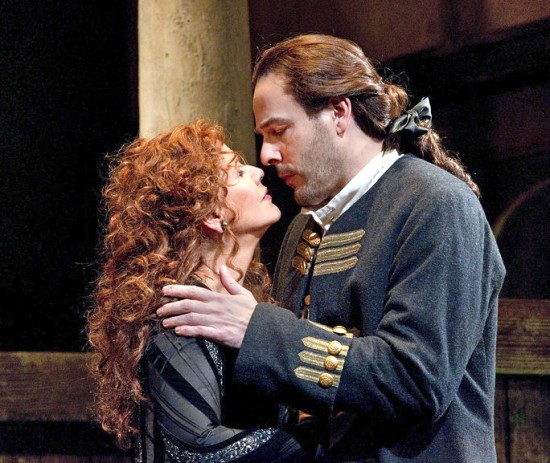
The King and Queen are reunited.  Their happiness is unbounded, and they sing about it.  My, do they sing.  Handel wrote many beautiful solo arias.  I could (and did!) spend hours listening to them with enjoyment.  But the harmonious blending of those two voices Рsoprano and counter-tenor Рin a love duet!  Moments like that are why I become passionate about opera.
Alas, the duet is ended all too soon.¬† Ended abruptly by the entrance of Grimoaldo and Garibaldo with drawn swords.¬† “So,” says the usurper, “This is the kind of chaste woman you are.¬† Walk away from my honorable proposal of marriage into the arms of an illicit lover.¬† He shall die.”¬† “Not so,” interjects Unulfo, “That’s her husband, Bertarido.”¬† “What’s the diff.¬† In that case he shall die as a traitor.¬† Guards!¬† Take him away.”¬† Curtain.
Here’s where we stand at the beginning of Act III.¬† Bertarido is in jail, subject to immediate execution and not happy about it all. Grimoaldo plans to kill him but needs to sing another hemming and hawing aria first. Garibaldo is getting increasingly impatient with his vacillating boss and resolves to kill him at the first opportunity.¬† Rodelinda, Unulfo, and Eduige are hatching an elaborate plot involving a secret tunnel to free the prisoner and escape to the countryside.¬† And the Opera Nut is running out of time and space.¬† Come to a theatre near you at 6:30 pm local time on Wednesday January 4, 2012 and see how it all plays out.
One last thought, before I sign off.¬† As Sara and I were leaving the theatre we wondered why Handel cast Bertarido as a castrato, when he was, in fact a very masculine character.¬† In fact, in many of¬†his operas he did similar casting.¬† I did a little research the next day and found out that in Handel’s time castrati were regarded as valued members of the music community and there was no hint of them being un-masculine.¬† Also, it was tradition in the field of opera that high voices and instruments were associated with “good”, whereas low pitches were associated with “evil”.¬† With this in mind, the assignment of voice-range was completely logical.¬† The two counter-tenors and the soprano were unquestionably good, the mezzo and tenor were mixed but ended up more good than bad, and the bass was pure evil.
Ciao – – The Opera Nut
Photos, except as noted: Ken Howard/Metropolitan Opera
This review by Philip G Hodge appeared in sanfranciscosplash.com on December 12, 2011

